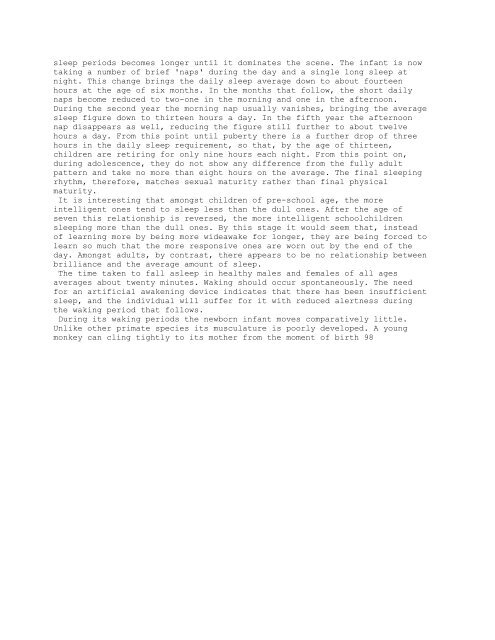You also want an ePaper? Increase the reach of your titles
YUMPU automatically turns print PDFs into web optimized ePapers that Google loves.
sleep periods becomes longer until it dominates the scene. The infant is now<br />
taking a number of brief 'naps' during the day and a single long sleep at<br />
night. This change brings the daily sleep average down to about fourteen<br />
hours at the age of six months. In the months that follow, the short daily<br />
naps become reduced to two-one in the morning and one in the afternoon.<br />
During the second year the morning nap usually vanishes, bringing the average<br />
sleep figure down to thirteen hours a day. In the fifth year the afternoon<br />
nap disappears as well, reducing the figure still further to about twelve<br />
hours a day. From this point until puberty there is a further drop of three<br />
hours in the daily sleep requirement, so that, by the age of thirteen,<br />
children are retiring for only nine hours each night. From this point on,<br />
during adolescence, they do not show any difference from the fully adult<br />
pattern and take no more than eight hours on the average. The final sleeping<br />
rhythm, therefore, matches sexual maturity rather than final physical<br />
maturity.<br />
It is interesting that amongst children of pre-school age, the more<br />
intelligent ones tend to sleep less than the dull ones. After the age of<br />
seven this relationship is reversed, the more intelligent schoolchildren<br />
sleeping more than the dull ones. By this stage it would seem that, instead<br />
of learning more by being more wideawake for longer, they are being forced to<br />
learn so much that the more responsive ones are worn out by the end of the<br />
day. Amongst adults, by contrast, there appears to be no relationship between<br />
brilliance and the average amount of sleep.<br />
The time taken to fall asleep in healthy males and females of all ages<br />
averages about twenty minutes. Waking should occur spontaneously. The need<br />
for an artificial awakening device indicates that there has been insufficient<br />
sleep, and the individual will suffer for it with reduced alertness during<br />
the waking period that follows.<br />
During its waking periods the newborn infant moves comparatively little.<br />
Unlike other primate species its musculature is poorly developed. A young<br />
monkey can cling tightly to its mother from the moment of birth 98








